May is Celiac Awareness Month, so I’m once again partnering with UnityPoint Health to give you a peek into what life is like for someone living with Celiac Disease…aka having to go gluten-free when you don’t really want to.
I was diagnosed with Celiac Disease, an autoimmune condition in which the ingestion of gluten leads to damage in the small intestines, shortly after Lincoln was born in 2013. It was a dark time of my life, to say the least, and you can read about my diagnosis story here. Celiac Disease impacts the body’s ability to absorb nutrients and can cause everything from unexplained infertility, to osteoporosis, and even cancer if left unmanaged.
So, what the heck is gluten anyway? Gluten is a protein found in cereal grains like wheat, barley and rye. The only way to manage Celiac Disease is to not eat foods containing gluten, which is tough because, like a newly crawling baby, it seems to be in just about everything. From the obvious like bread, cake and beer, to the not so obvious like play dough, hair spray and even prescription drugs. (For a full list of all the names gluten can go by, check out my ebook.) Eating a source of gluten as small as a bread crumb can make someone with Celiac Disease ill. For me, getting “glutened” can mean up to two weeks of stabbing stomach pains, extreme fatigue, headaches, and brain fog.
As I sit down to write this post, my heart starts racing and I’m getting a little sweaty. I feel like this is a common reaction for people with Celiac Disease when they begin to tell their story. Why? Because so many people see the words “gluten-free” and immediately roll their eyes. Every time I tell someone I need to eat gluten-free, I’m fully prepared for them to pull out a mega phone and yell “YOU’RE ANNOYING.”
I get it. I really do. But I don’t have a choice. Thanks to genetics plus a bad delivery with Lincoln, which triggered the disease that lay dormant inside of me for 30 years, I got an autoimmune condition that comes with restrictions I wouldn’t wish on my worst enemy.
Before I go on, I want to acknowledge that things could be so much worse. I have a disease that is managed through diet (which to be fair, sounds way easier than it is.) I don’t have cancer. I don’t have heart disease. I don’t have diabetes. These particular diseases can be caused by Celiac Disease, but my condition is not currently life threatening, and I am so grateful for that.
I also don’t write this post for pity. At ALL. We’ve all got our things! Rather, my intent is to inform people about Celiac Disease, and give those who have written off the gluten-free community as annoying or just following the latest fad diet, a different perspective.
So, what’s life like living with Celiac Disease? Anxiety-inducing. Having to cook and eat gluten-free is actually the least of my worries (at home, anyway – restaurants are a completely different story,) and I feel like I’ve shown you over the past 3+ years it’s manageable. For me, the most difficult part of having Celiac Disease is the psychological and social impacts it’s had on my life.
It’s hard…
- Feeling like a constant burden to my family and friends.
- Skipping social events because it’s awkward being the only one not eating.
- Paying $7 for a loaf of bread.
- Feeling miserable for 1-2+ weeks every time I accidentally ingest gluten.
- Having to feverishly research every restaurant I eat at then feel anxious for 24 hours after my meal.
- Putting my health in the hands of everyone from the waiter, to the chef, to the person who purchases ingredients, to the dishwasher when I choose to eat at a restaurant.
- Poring over every label of every packaged food I buy.
- Always being the odd man out.
- Knowing I’ll never be able to fully experience the local food and culture of all the destinations on my bucket list.
- Constantly apologizing for and feeling self-conscious about my disease.
- Worrying that I’ve passed this beast onto my children.
- Hurting people’s feelings and creating an uncomfortable situation by having to turn down foods they’ve cooked because I don’t know if it’s safe.
To sum it up…living with Celiac Disease, mmm, sucks.
That said, I’m a firm believer that everything in life happens for a reason. Maybe my why is because I have this amazing platform to reach and support people with Celiac Disease.
Maybe it’s so I can reassure someone who has received a Celiac Disease diagnosis that, although it feels like their world is crashing down, everything is going to be ok.
Maybe it’s so I can share safe and delicious gluten-free products that can help someone with Celiac Disease feel normal for a minute.
Maybe it’s so I can inspire someone whose had unresolved health issues for years ask their doctor to be tested for Celiac Disease. (This has happened multiple times, and surprise – Celiac diagnosis!)
Maybe it’s so I had the knowledge to help one of my best friends who was just diagnosed with Diffuse Scleroderma navigate the confusing world of autoimmune diseases.
Maybe it’s so I could write an ebook to help people go gluten-free when they’re struggling to understand everything that entails.
Maybe it’s so I can change the opinion of someone who thinks everyone who eats gluten-free has a choice.
I truly feel like my life’s purpose in regard to my work outside the home has something to do with serving people with Celiac Disease. I don’t know what that looks like quite yet, but nearly four years ago life gave me lemons and I’ll be damned if I don’t make lemonade. That is to say – stay tuned. :)
Now, I wanted to share a doctor’s take on Celiac Disease with you so I reached out to Dr. Thomas Martin of the Iowa Digestive Diseases Center, which works with UnityPoint Health, with a few questions I routinely get asked. Thought you might find this information interesting!
Why do you think more people are getting diagnosed with Celiac Disease then ever before?
I think there’s an increased awareness of Celiac Disease, overall. People are recognizing it’s a genetic disease and there’s more discussion among family members when someone is diagnosed. I see people becoming more proactive in educating family members, first degree relatives in particular, to get checked out. I also think primary care providers are much better at screening patients with a family history or have symptoms that suggest CD. With this being an autoimmune disease, rheumatologists, endocrinologists (diabetes and thyroid diseases) and dermatologists will refer me patients they have screened through antibody testing.
What are the most common symptoms people complain about before getting tested/diagnosed with Celiac Disease?
The spectrum of symptoms varies in regard to initial complaint. Most commonly the symptoms are bloating, diarrhea and/or unintentional weight loss. In some patients Dermatitis Herpetiformis, a rash specific to Celiac Disease, is their first presentation. There is an entity called irritable bowel syndrome, or IBS, that is very common in the gastroenterology field. The symptoms of IBS can mimic that of CD and vice versa. IBS is a complicated diagnosis but some patients with bloating, joint pain, diarrhea and fatigue may in fact have CD. Therefore, we screen our IBS patients through antibody testing.
How can someone determine if they have non-Celiac gluten sensitivity?
Non-Celiac gluten sensitivity is an evolving topic. Up to 2-3 years ago I was admittedly a purist regarding going gluten-free in that I did not recommend going gluten-free, to a patient unless we had the laboratory or endoscopic findings to support CD. Some of that is training in fellowship and some is that a gluten-free diet is life altering in that it changes how people buy food for themselves/family, eat at restaurants, eat on vacation, etc. I think if the lab + endoscopy show no evidence of CD but they respond to a gluten-free diet symptom-wise, that would be suggestive of gluten sensitivity. One note is if a patient has been off gluten for more than a month or so, the actual tissue damage we see with Celiac Disease may not be seen on a biopsy. The Celiac blood tests can take longer to normalize. My point is that if a patient has already been on a gluten-free diet, the biopsy and blood work can be tough to interpret. Patients who are already [eating] gluten-free and feeling better would need to go back on gluten to get an accurate measure. That is a tough one when a patient comes in feeling well on a gluten-free diet and wants to know if they truly have Celiac Disease.
What could happen if Celiac Disease goes undiagnosed/unmanaged?
Celiac Disease affects the small bowel tissue. The small bowel is the body’s workhorse for absorption of nutrients from our food. Both iron and calcium are largely absorbed at the duodenum (upper most small intestine.) Celiac Disease most commonly involves the duodenum, though it can occur anywhere along the small intestine. Therefore, malabsorption (the villi of the small bowel are flattened/destroyed and can’t absorb the iron from food) of iron results in iron deficiency anemia. Malabsorption of calcium can result in osteoporosis/osteopenia (thinning of the bones). So, Celiac Disease can result in anemia and increase risk of bone fracture if left untreated. There are many different vitamin deficiencies that can also occur as the small bowel is responsible for a large part of vitamin absorption. Calcium and iron are unique due to their specific site of absorption at the duodenum, where Celiac Disease is most commonly found. A very rare type of lymphoma can occur with Celiac Disease that has been left untreated over many years.
What are the tests/procedures done to diagnose Celiac Disease?
The most common tests to diagnose someone with Celiac Disease are antibody/blood tests and endoscopy with small bowel biopsy. Standard endoscopy reaches the duodenum where Celiac is most commonly found. The blood tests range from 80-97% accurate.
Thank you, Dr. Martin!
Now, confession: I had my Mom read this post before hitting “publish” to make sure it wasn’t too depressing. I want to be completely honest, but I also don’t want you to think my life is miserable. Because it’s not (and I have a robust wrinkle cream collection for my permanent smile lines to prove it!) Yes, I have an incurable autoimmune disease that has a huge impact on my everyday life, but I’m also an incredibly happy mom and wife. I have wonderful friends and family members who would turn into pretzels if they bent over any further backwards to accommodate my diet. I have a job that allows me to help others in the same situation.
I can run. I can breathe. I can dream. I can do.
I am LIVING!
I can also eat Reese’s Peanut Butter Cups. Yep, they’re gluten-free! (Well, the normal sized ones, not the holiday shapes. #celiacproblems)
My point is, I can choose to be miserable about my disease or I can choose to find the good, the happy and the positive in my everyday life. I have so much to be thankful for, and am hopeful for a cure in the future. Until then, it’s full steam ahead!
~~~~~
Since I know some might be curious, the initial test to screen for Celiac Disease is a simple one and can usually be done at your general practitioner’s office (mine was.) As Dr. Martin mentioned, you must be eating foods containing gluten for the test results to be accurate, so don’t toss all your gluten-containing goodies if you want to be tested. Your doctor will be able to recommend you to a gastroenterologist for further testing if the results come back indicating Celiac Disease.
If you live in Iowa, Illinois or Wisconsin, UnityPoint Health provider services are available. Visit www.unitypoint.org, select the location you live in, click the “Find a Doctor” tab, then select “Gastroenterology and Hepatology” to find a provider near you.
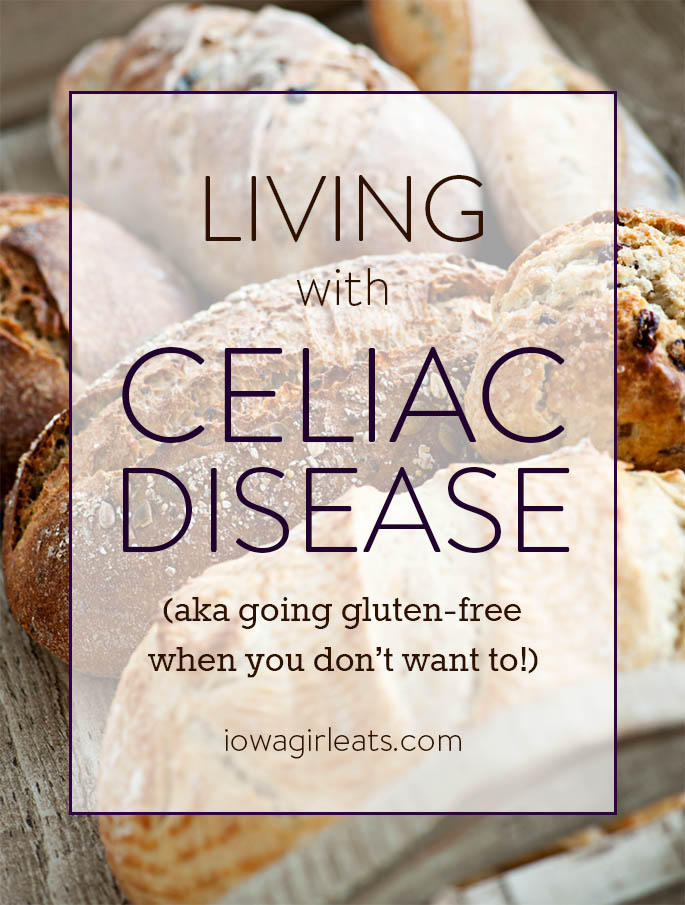
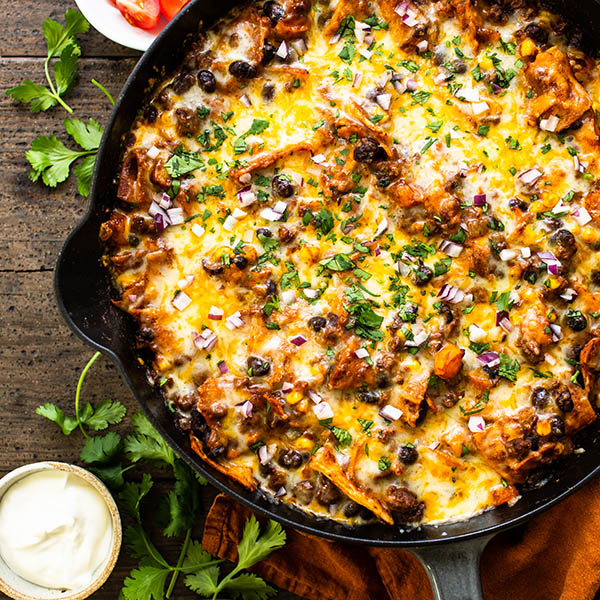


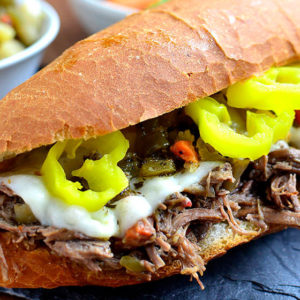

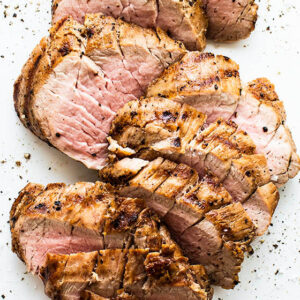



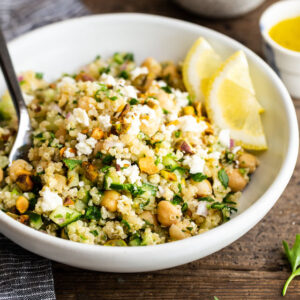
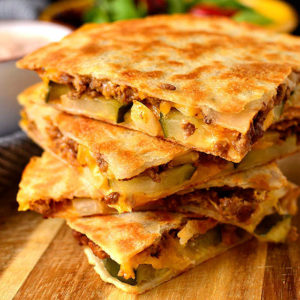
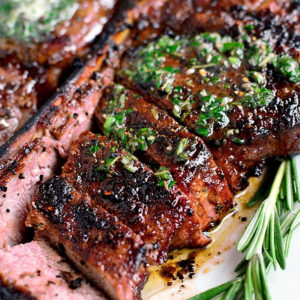
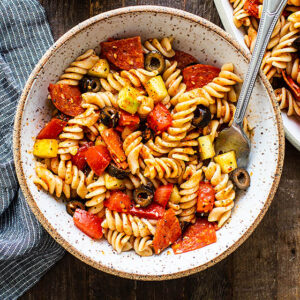


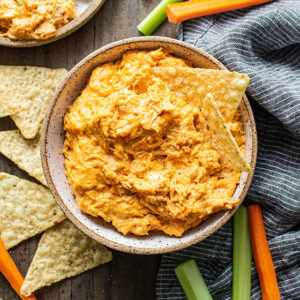
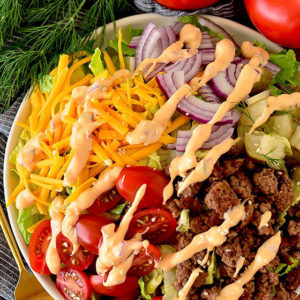

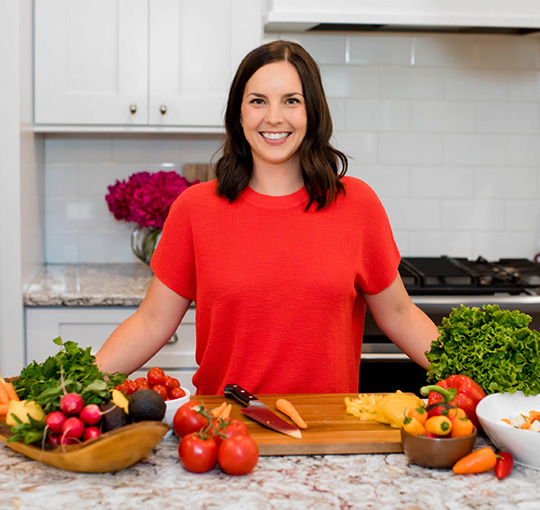
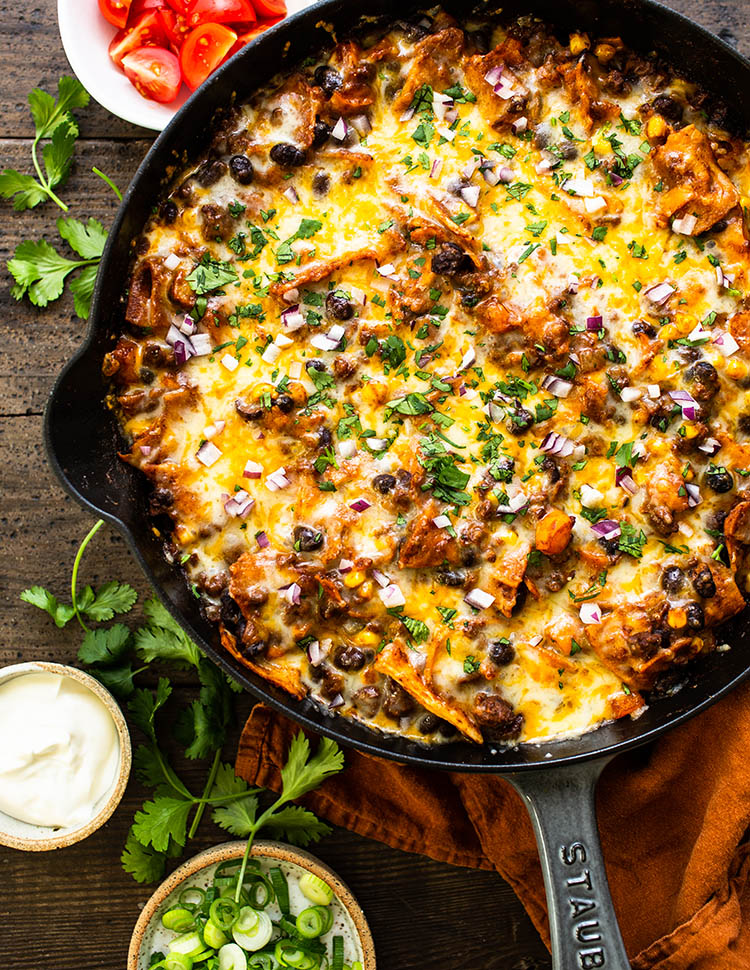
Thank you for all of this information! I will definitely refer back to your site! I was just diagnosed with Celiac yesterday, so I’m in a little shock! Just trying to figure out how I’m going to navigate my new reality! Thanks again!
I’m so sorry to hear that, Kim! I hope each day is easier than the last – let me know how I can help!
I came across your blog by accident about Living with Celiac Disease after googling a recipe for an upcoming brunch. When I read the part about what is the worst part of it, being physiological and social impacts.. and all your reasonings. I thought “these are my words, this is my life!” It’s like validation for me honestly because not many people “get it”. I was sick from 2018 until my Celiac diagnosis in 2022. It was one of those I am so thankful I know what’s wrong with me mixed with a little of oh my gosh I can’t eat anything anymore emotion.
I am going to be trying so many of your recipes! Thanks for this it truly means more than youknow!
I’m so, so glad you could relate and find comfort in reading this post, Toshia! Truly the hardest part of this disease imo is the mental and emotional toll it takes, especially at the beginning. I’m so sorry you were unwell for four years (ugh!) but like you said, I bet it feels SO good to finally have an answer!!
Thank you.
Hi I HAVE had DERMATITIS HEPETAFORMIS SINCE 1975 and took DAPSONE TILL last year when I thought I HAd IBS till my new Dr, did blood work and told me i had CELIAC DISEASE so i have been trying glueten free since then good thing my Husband doesnt mind and we are vegetarians , just trying to survive , thanks for the blog.
Thank you for sharing your journey. I was recently diagnosed with Celiac disease at the age of 67 and I am a diabetic. It is not easy, and I really wish Medicare would pay more for with celiac disease, I was kinda just thrown into it without much help. I read this article, https://www.ez.insure/landing/2021/04/celiac-disease-medicare/ and hopefully the bills get passed so dieticians are covered for seniors with celiac disease.
Thanks for your insights. Having just been diagnosed, I have gone through about one thousand emotions. So much to process still. Thanks for the help.
Thank you for talking about your experience with Celiac disease. My friend just told me that she was diagnosed with it so it made me research about it. You offer great info here. I also learned about it some more through this interview article, https://www.ez.insure/landing/2018/09/celiac-disease-q-a/ It sounds painful and I could not imagine having to give up some of my favorite foods like bread! Its interesting and explains a lot from someone who deals with it’s perspective. Thoughts?
I have always thought it was impossible for me to get my boyfriend then i came across robinsonbucler@gmail com. i told him my problem and he did what was to be done and my lover came back after 48 hours, ????
[…] in addition to the stomach pains, brain fog, skin rashes, and extensive exhaustion. This post by Iowa Girl Eats sums up pretty much how I’ve experienced the last few years and this new diagnosis (and it […]
Your article is spot on! Thank you for summing up the emotions. My daughter and I have celiac. She is 14 and had a rough weekend thanks to gluten so this was so timely. Thank you!
My son was diagnosed with some severe anaphylactic food allergies (peanut and egg) and I can absolutely relate to this post. The anxiety, the expense, the social stigma, the stereotypes. There are a lot of people who don’t understand. I’m grateful for people like you who are willing to share your personal stories. It helps those of us trying to navigate our new “normal”, whatever that may be. You’re an awesome resource to people in your shoes!
Thank you for sharing. My hubby has EoE along with a wheat allergy. Ingesting gluten causes his esophagus to close off and sends us to the ER. He is on meds and eats GF, but it was a struggle just to get where we are. Your story resonates as he struggles with the eye rolls, being the odd man out, and being told, what’s the big deal. I have always loved your blog, your recipes are fabulous. Sharing your story makes a good connection. Thank you. ?
My granddaughter, who is 11, was just diagnosed with this. Doc at blank said she is an extreme case. So we are trying to learn fast what she can eat. You are right even a bread crumb is bad. Its buy it and she if she likes it tests. Any help you could give would be great. She is afraid to eat because of the pain it causes.
Thank you for this message. I have CD and it is tough. I feel all these things you’ve talked about. I take it a day at a time. Thanks again.
Thank you for sharing this post! It should be out there for all to see! I can Relate to all you have said! One of the hardest things for people to understand is the Cross-contamination and once A Celiac-Positive person gets into Gluten, the whole healing process has to start again!
Thanks again for your encouragement!
Thank you for this site. I recently had bloodwork indicating Celiac and am awaiting the endoscopy. It sounds like the bloodwork is fairly accurate so I’m struggling with acceptance and holding out with hope that it’s a false positive.
I’ve grown up loving to bake and continue traditions with my kids and husband, I feel bad that this will no doubt affect them too. And, did I pass it on to my kids :(
I want to look at the possible positives like you mentioned. I have family and friends with gluten sensitivity, maybe I can share recipes I know I’ll want to try (cinnamon rolls gf). But I’m already stuck on mourning the possible loss of gluten, and feeling guilty because there’s people with much worse and I’m wallowing in self pity.
Thank you for your honest and positive post, it makes a difference.